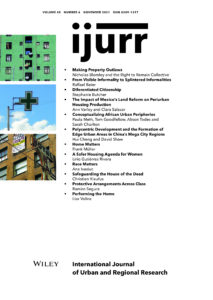This article explores the everyday politics through which citizenship is negotiated by diverse residents, analysing the case of Bansighat, an informal settlement in Kathmandu, Nepal. It focuses on both the collective tactics of the Nepali women’s federation of the urban poor—Nepal Mahila Ekata Samaj—as well as the quotidian practices of diverse residents around water and sanitation. This analysis reveals the variegated politics through which citizenship plays out—reflecting complex interactions between wider processes of urban transformation in Kathmandu, localized socio‐spatial conditions of Bansighat and long‐standing social relations in Nepali society. The empirical findings help to make more explicit the politics through which some residents are able to capitalize and transform diverse tenure and infrastructural practices into a broader sense of legitimacy or belonging in the city, while simultaneously engendering exclusions for others. This article accordingly reflects on how broader class and ethnic power relations play out through everyday citizenship negotiations, generating differentiated experiences of citizenship for diverse individuals.

